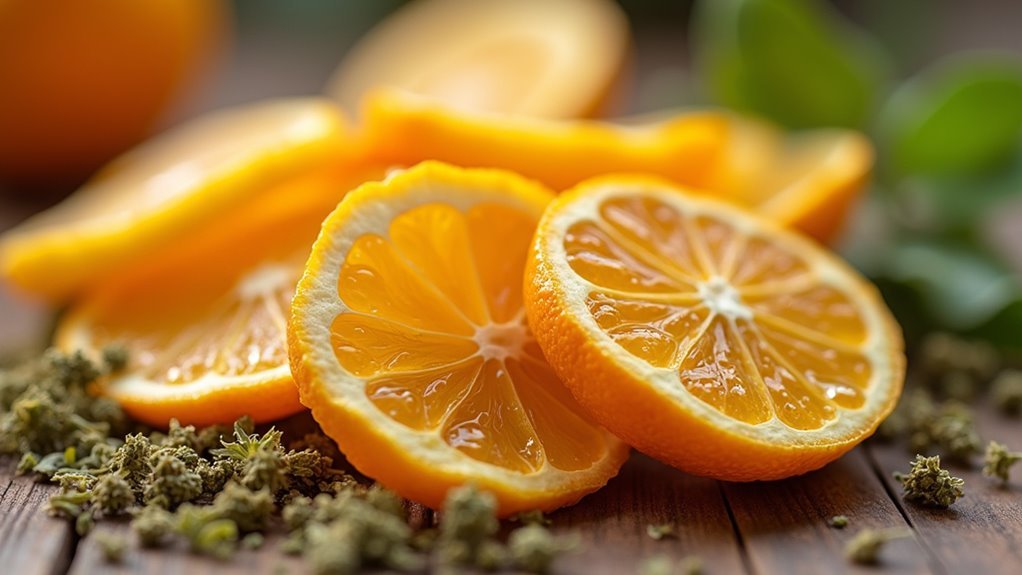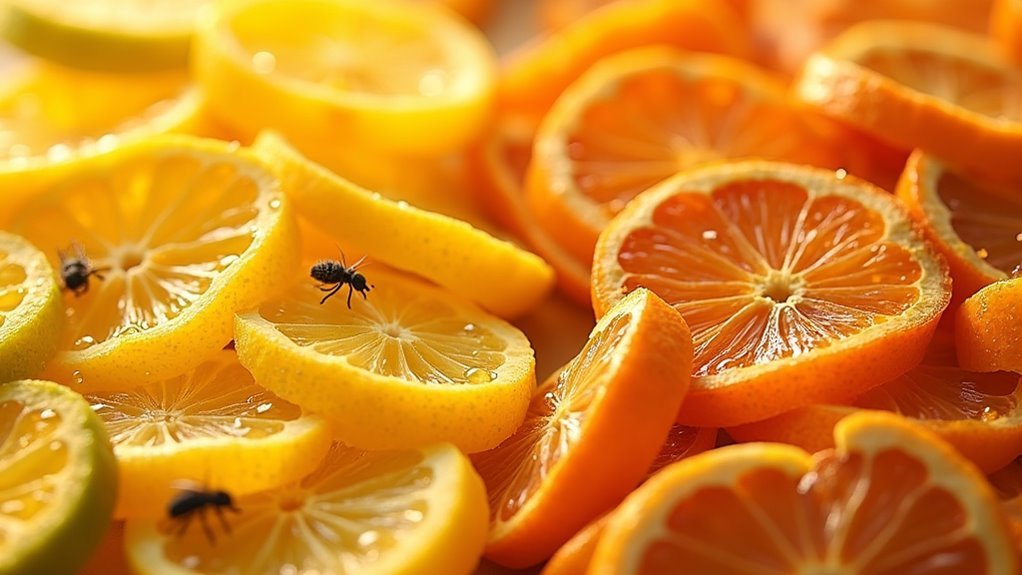Dried citrus peels repel pests through their essential oils, particularly limonene, which disrupts insects’ sensory systems and masks food aromas that typically attract them to your garden. However, the drying process considerably reduces limonene concentration to less than 1.2%, making dried peels less effective than fresh ones. These compounds particularly affect soft-bodied insects like aphids, ants, and whiteflies by disrupting their communication and scent trails. Understanding proper preparation and placement techniques will help you maximize their pest-deterrent potential.
The Science Behind Citrus Oil Compounds in Dried Peels

Three key compounds make dried citrus peels a potential pest control solution, though their effectiveness depends heavily on concentration and freshness.
When you use dried citrus peels, you’re relying on essential oils like limonene for their insect-repelling properties. However, the volatile organic compounds that make fresh peels effective quickly evaporate during the drying process.
The drying process causes essential oils like limonene to evaporate, significantly reducing the pest-repelling effectiveness of citrus peels.
You’ll find that compound concentration becomes vital here. Orange peels contain less than 1.2% limonene, which considerably diminishes once dried. The reduced moisture content further limits potency compared to fresh peels.
Despite these limitations, dried peels can still mask food aromas that attract pests, disrupting their scent trails. While not as powerful as fresh alternatives, they may provide modest pest deterrence by making your environment less inviting to unwanted insects.
How Limonene Acts as a Natural Pest Deterrent
When you use dried citrus peels for pest control, you’re harnessing limonene’s unique molecular structure that naturally repels insects through its volatile properties.
This compound works by disrupting pests’ sensory systems and masking the food aromas that typically draw them to your space.
However, you’ll need to understand that limonene’s effectiveness decreases over time as the oils evaporate, requiring strategic timing and application methods for best results.
Limonene Chemical Properties
Although dried citrus peels contain less active compound than their fresh counterparts, they still harbor limonene—a colorless liquid that serves as nature’s pest deterrent.
You’ll find this compound’s insect-repelling properties stem from its unique chemical properties that disrupt pest behavior patterns. Limonene’s volatile nature means it evaporates quickly, which explains why dried peels lose their fragrance and effectiveness over time.
The concentration in dried peels is considerably lower than fresh ones, but it’s still effective against pests like mosquitoes, ants, and flies.
This natural compound works for pest control by affecting insects’ nervous systems and disrupting their scent trails, making it a valuable tool in your natural pest management arsenal.
Pest Disruption Mechanisms
Limonene disrupts pest behavior through multiple targeted mechanisms that interfere with insects’ fundamental survival processes. When you use citrus peels containing this natural compound, you’re deploying powerful insect-repelling properties that target pests’ sensory receptors directly.
The limonene creates disorientation by scrambling insects’ navigation systems, preventing them from following established scent trails to locate food sources. This pest disruption occurs because limonene masks food aromas that typically attract mosquitoes, flies, and ants to your space.
However, you’ll find fresh peels deliver superior results compared to dried peels, which lose significant potency as essential oils evaporate over time. Since dried citrus peels contain less than 1.2% limonene, their effectiveness becomes limited, making fresh applications more reliable for consistent pest control.
Effectiveness Duration Factors
The concentration and persistence of limonene directly determine how long your citrus peel barriers remain effective against unwanted insects.
Fresh peels pack maximum punch with high limonene levels, but dried citrus peels lose their potency rapidly. The volatile nature of these aromatic compounds means they evaporate quickly, reducing concentration below effective thresholds.
Once limonene drops below 1.2%, your peels can’t repel pests efficiently. The effectiveness duration typically spans just a few days as active compounds dissipate. You’ll notice the scent fading as repellent effects weaken.
For consistent pest deterrence, you must replace dried peels regularly since their aromatic compounds won’t maintain sufficient concentration for extended periods.
Understanding this degradation helps optimize your natural pest control strategy.
Which Garden Pests Are Most Affected by Citrus Scents
Several common garden pests show strong aversion to citrus scents, making fresh orange peels a valuable natural deterrent in your pest management arsenal.
The limonene in fresh citrus peels effectively targets slugs, aphids, ants, whiteflies, and fruit flies. These volatile organic compounds create a strong scent that disrupts pests’ scent trails and masks attractive food aromas.
Limonene compounds in fresh citrus peels disrupt pest communication and mask food scents that attract garden invaders.
You’ll find citrus scents particularly effective against soft-bodied insects like aphids and whiteflies, which can’t tolerate the concentrated oils. Ants avoid citrus-treated areas because it interferes with their communication pathways.
However, remember that dried peels lose their potency and won’t repel pests effectively. To deter insects successfully, you’ll need fresh peels with active compounds.
Combine citrus methods with other pest management strategies for thorough garden protection.
Comparing Fresh Vs Dried Citrus Peels for Pest Control

When you’re choosing between fresh and dried citrus peels for pest control, you’ll find that fresh peels pack a much stronger punch against unwanted insects and rodents.
Fresh peels contain high concentrations of limonene and other volatile compounds that create the potent scent pests can’t stand, while dried peels lose most of these effective oils through evaporation.
You’ll need to replace dried peels frequently since their pest-repelling power drops to less than 1.2% limonene content, making them far less reliable for your garden defense strategy.
Fresh Peel Effectiveness
Fresh citrus peels pack a powerful punch against unwanted pests, delivering markedly better results than their dried counterparts. The effectiveness stems from their high moisture content, which preserves volatile organic compounds that create that distinctive citrus scent pests can’t stand.
Here’s what makes fresh peels superior for pest-repellent purposes:
- High limonene concentration – Fresh peels contain markedly more of this natural deterrent compound.
- Active essential oils – Volatile compounds remain potent and release continuously.
- Strong aromatic properties – The citrus scent stays powerful enough to effectively repel various pests.
While you’ll need to replace fresh peels regularly to maintain their repellent qualities, they’ll consistently outperform dried peels.
Once peels dry out, their limonene drops below 1.2%, making them practically useless against unwanted visitors.
Dried Peel Limitations
Unfortunately, dried citrus peels can’t deliver the same pest-fighting power you’ll get from fresh peels. When citrus peels dry, their volatile organic compounds evaporate quickly, drastically reducing pest-repelling effectiveness. Fresh peels contain higher limonene concentrations—this natural repellent becomes virtually useless once dried, dropping below 1.2%.
| Fresh Peels | Dried Peels |
|---|---|
| High limonene content | <1.2% limonene |
| Strong volatile oils | Evaporated compounds |
| Proven effectiveness | Anecdotal evidence only |
| Active pest deterrent | Minimal properties |
You can’t restore these essential properties by rehydrating dried citrus peels. The oils responsible for repelling pests are permanently lost during the drying process. While many people swear by dried peels, their effectiveness relies on anecdotal evidence rather than scientific backing, making fresh peels your best choice for reliable pest control.
Proper Preparation Methods for Maximum Effectiveness
Although dried citrus peels naturally contain pest-repelling essential oils, you’ll need to prepare them correctly to release their full potential. The key lies in preserving those essential oils that give citrus peels their pest-repelling properties.
Follow these preparation steps for maximum effectiveness:
- Dry thoroughly – Confirm peels are completely dried to preserve their potent oils.
- Grind or chop – Break peels into smaller pieces for effective release of citrus scent.
- Store properly – Keep dried citrus peels in an airtight container to maintain potency.
You’ll need to replace dried peels regularly since oils evaporate over time, especially when they lose their fragrant scent.
For enhanced results, combine natural deterrents like herbs or spices with your citrus peels to create all-encompassing pest barriers.
Strategic Placement Techniques Around Your Garden

Once you’ve properly prepared your dried citrus peels, their placement becomes essential for creating effective pest barriers throughout your garden.
Strategic placement around plant bases creates a natural barrier that effectively blocks pests from reaching food sources. You’ll want to scatter these peels along garden pathways and entrances where unwanted insects and wildlife typically enter your space.
For container gardens, place dried citrus peels directly on soil surfaces to repel pests while adding a decorative touch.
Don’t forget to reapply regularly since their pest-repelling effectiveness diminishes over time throughout the growing season.
Enhance results by combining dried citrus peels with other natural deterrents like coffee grounds or garlic, creating a multi-layered defense system that maximizes your garden’s protection against various pest species.
Duration and Reapplication Requirements for Dried Peels
The effectiveness of your dried citrus peels won’t last indefinitely, requiring careful attention to timing and replacement schedules. These natural pest deterrents lose their power to repel pests as essential oils evaporate, typically within days of placement.
Your reapplication schedule depends on three critical factors:
- Environmental conditions – humidity and temperature accelerate oil degradation
- Aroma strength – replace peels when they lose their distinctive scent
- Pest pressure – monitoring pest activity helps determine replacement frequency
You’ll need fresh dried citrus peels every 3-5 days, especially outdoors where environmental factors work against you. Warmer, drier conditions cause faster deterioration.
Don’t rely solely on visual cues; trust your nose. Once the aroma fades, the repelling power disappears.
Combine this method with other pest control strategies for best results.
Potential Drawbacks and Limitations to Consider
While dried citrus peels offer an appealing natural approach to pest control, they come with significant limitations that can undermine your efforts. The drying process depletes volatile oils and reduces limonene concentration to less than 1.2%, drastically weakening their repellent effect. You’ll find that dried peels can’t repel pests effectively due to this diminished potency.
These drawbacks extend beyond poor performance. As dried citrus peels decompose slowly, they won’t provide immediate pest control when you need it most.
Worse yet, they can attract larger pests like rodents and raccoons to your garden instead of deterring unwanted visitors. Rather than gambling with these limitations, consider adding the peels to your compost pile where they’ll serve a more beneficial purpose.
Alternative Natural Pest Control Methods That Actually Work
Fortunately, several proven natural pest control methods can deliver the results that dried citrus peels can’t provide.
While citrus peels make excellent compost material, they’re unreliable pest control methods for serious garden pests.
Instead, you’ll find these alternatives more effective:
- Physical barriers and water sprays – Use floating row covers or forceful water sprays to physically remove aphids and spider mites from your plants.
- Beneficial insects and companion planting – Plant diverse native species to attract ladybugs and lacewings that naturally control pest populations.
- Organic materials and essential oils – Apply neem oil or insecticidal soap following label instructions to repel insects without harming beneficial insects.
These natural pest control strategies provide reliable, science-backed results as effective repellents.
Frequently Asked Questions
Do Citrus Peels Keep Bugs Away?
Fresh citrus peels can temporarily keep bugs away due to limonene oils that repel ants and fruit flies. However, you’ll find their effectiveness quickly diminishes as the oils evaporate over time.
Do Citrus Peels Repel Rodents?
You might see some rodent deterrent effects from citrus peels due to their limonene content and strong scent. However, there’s limited scientific proof, so you’ll need additional pest control methods for reliable results.
Is Citrus a Natural Bug Repellent?
You can use citrus as a natural bug repellent since it contains limonene and volatile compounds that deter insects. However, you’ll get better results with fresh peels because dried ones lose effectiveness.
Why Should You Place Orange Peels Around Your Patio?
You should place orange peels around your patio because they’ll create a natural barrier against ants, mosquitoes, and flies while masking food odors that attract insects to your outdoor space.
In Summary
You’ll find dried citrus peels offer an eco-friendly pest control solution, but don’t expect miracles. They work best as part of a thorough strategy rather than a standalone fix. You’ve got to prepare them properly, place them strategically, and reapply regularly for any meaningful results. While they won’t eliminate severe infestations, you can use them effectively alongside other natural methods to create a pest-resistant garden environment.





Leave a Reply